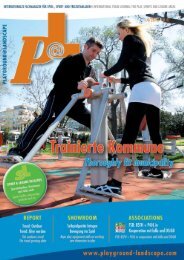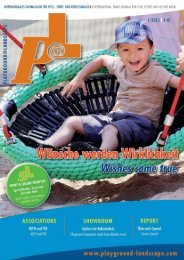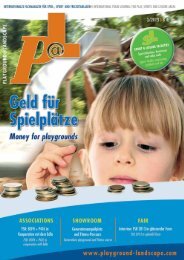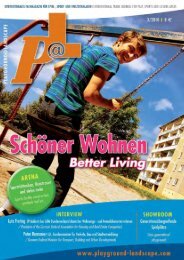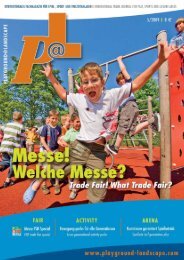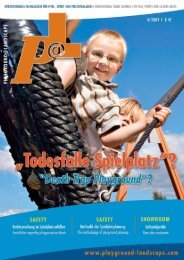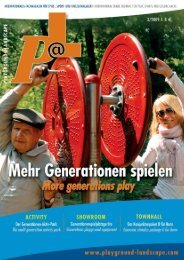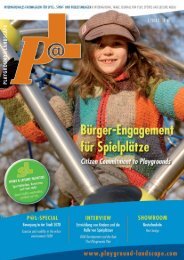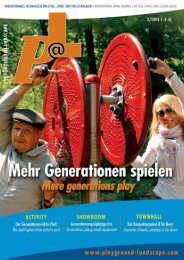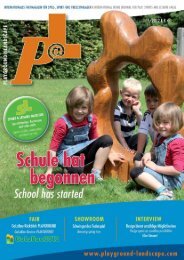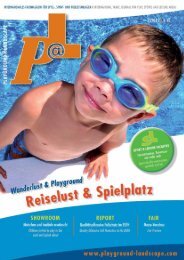Download - Playground@Landscape
Download - Playground@Landscape
Download - Playground@Landscape
Erfolgreiche ePaper selbst erstellen
Machen Sie aus Ihren PDF Publikationen ein blätterbares Flipbook mit unserer einzigartigen Google optimierten e-Paper Software.
ACTIVITY<br />
Movement from the outset<br />
By Uwe Lübking, German Association of Towns<br />
and Municipalities (DStGB)<br />
Children have a natural urge to move around. They jump, climb,<br />
balance or test their capabilities in other ways. If we're honest,<br />
however, the sight of children playing outdoors is becoming rarer and<br />
rarer. This lack of mobility indicates serious consequences for the<br />
children concerned.<br />
The findings are alarming:<br />
● 60% of children have postural problems by the time they start school<br />
● 30% of children are overweight by the time they start school<br />
● 40% of children demonstrate weaknesses in their physical<br />
coordination<br />
● 50% of children can't run backwards anymore<br />
● 44% of year 4 pupils suffer from occasional back pain and 8%<br />
from permanent back pain.<br />
Increasing physical passivity has extensive effects on health. These range<br />
from a low level of physical fitness to postural problems and poor mental<br />
capacity. Long-term effects in adulthood concern the early onset of cardiovascular<br />
diseases and back pain. One third of patients newly diagnosed with<br />
Type 2 diabetes (adult-onset diabetes) today are adolescents. Experts also<br />
report an increase in accidents relating to poor physical control amongst<br />
young people.<br />
The children of today are often referred to as the 'backseat generation'. An<br />
increasing number of children no longer master the routine task of cycling<br />
e.g. keeping on track. This means there will be children who don't see bikes<br />
as a means of transport.<br />
The reasons for this lack of mobility are complex: many parents feel that<br />
the route to school is too dangerous for their children or don't send their<br />
children to the nearest primary school but to their chosen school, which<br />
can often only be reached by car. Public areas are becoming more and more<br />
condensed, so there is often nowhere for children to play near their home<br />
or adults rule out such places as problematic. Even when there are places<br />
for children to run around, they often stay at home, preferring to spend<br />
their free time in front of the TV or computer. The amount of time children<br />
spend outside has been decreasing since the seventies, from an<br />
average of four hours to just one hour.<br />
There are also additional problems for uneducated families: bad diet,<br />
smoking around children and an excessive amount of time spent at<br />
the computer are often a hotbed for weight problems, lack of concentration<br />
and speech disorders. 7.6% of children indicate problems<br />
in social behaviour, 34% of six-year-olds have language or speech<br />
disorders and 7.2% of children have a noticeable mental illness.<br />
A child's natural urge to move around should be better met in<br />
nurseries. A 'sitting nursery' needs to become a 'physical education<br />
nursery', which, in many cases occurs in collaboration<br />
with sports clubs or other institutions, for example. The concept<br />
of a physical education nursery should be implemented<br />
as extensively as possible. A PE nursery will establish<br />
23



